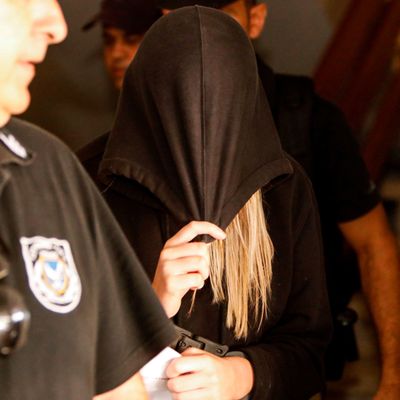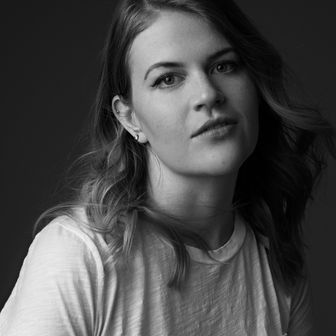
Last week, a 19-year-old British woman was found guilty in a Cypriot court of lying about being gang-raped by a dozen young Israeli men in the hotel where she was vacationing; the charge, for “public mischief,” carried a maximum of one year in prison. But after international outrage, a judge has suspended her sentence, proclaiming that by doing so he was giving her “a second chance.” (The girl still spent over a month in prison this summer as she awaited the beginning of her trial.)
The woman, who has not been publicly identified, was first arrested on July 17, after she retracted her initial accusation. Later, she told a judge that the police had forced her to change her story, and that she only signed the retraction after she was subjected to hours of unrecorded questioning by detectives, without any lawyer present. She added that she was, “scared for [her] life.”
The case has drawn heavy criticism around the world, with some protesters calling for a tourism boycott of Cyprus, claiming it is unsafe for women and travelers.
“The message to foreign women thinking of booking a holiday in Cyprus could hardly be more stark,” Joan Smith, the chair of the Mayor of London’s Violence Against Women and Girls Board wrote, in an op-ed for the Guardian. “If you are attacked don’t expect the authorities to help you.”
The U.K. government has also expressed concern about the situation, and in a statement, the Foreign and Commonwealth Office said it would be raising the issue with Cypriot authorities.
Below, everything we know about this troubling case.
The initial accusation
In July, the teenager was staying at the Pambos Napa Rocks Hotel in the resort town of Ayia Napa, on Cyprus’ southeastern coast on a working holiday. According to the New York Times, during her trial, the woman said that she was in a romantic relationship with one of the accused men. On the night of July 17, while they were having sex in his hotel room, other young men began to enter the room and assault her. Some of them filmed the attack on their phones.
She said she eventually managed to escape and make her way to a nearby clinic, where the doctor examined her and then called the police. The next day, police took 12 Israeli men and boys between the ages of 15 and 22 into custody.
The recanting
Ten days after her initial report, police called the teenager back in for questioning, claiming that investigators had found inconsistencies in her statements. In the early hours of July 27, after eight hours of unrecorded questioning by detectives without any lawyer present, the woman signed a statement retracting her assault claim, and police charged her with “giving a false statement over an imaginary offense.”
The next day, the seven remaining Israeli men in custody were released (five had been released a few days earlier).
The woman’s legal team argued that she had been suffering from post-traumatic stress disorder at the time. “People suffering with PTSD can make retraction statements just to get themselves out of the situation in which they find themselves,” Michael Polak, the woman’s lawyer and the director of Justice Abroad, told the BBC after Monday’s verdict.
The woman also said in her trial that during her questioning, police would not allow her to call her mother, who was also in Cyprus, and that the police questioning her forced her to change her statement. “They asked me to say that it wasn’t a rape,” she said in court. Police have denied this accusation.
After she was arrested in late July, the woman was put in prison for over a month as she awaited the beginning of her trial, and her passport was seized so that she could not leave the country.
The trial
On August 27, the woman pleaded not guilty to making false allegations. Her trial officially began days later, and she was told she’d have to remain in Cyprus over Christmas to receive the final judgment. None of the 12 men, who had since returned to Israel, were called to give evidence in the trial.
Months later, on Monday, December 30, Famagusta District Court Judge Michalis Papathanasiou found the woman guilty of “public mischief,” a charge which carries with it a maximum fine of €1,700, and up to a year in jail. Papathanasiou cited the woman’s statement recanting her claim, and said he thought she had made up the accusations because she was “ashamed” of the footage of her having sex, which some of the men had filmed. “She did not tell the truth, and tried to mislead the court,” he said.
On the day of the final judgment, 30 or so protesters from the group Network Against Violence Against Women staged a demonstration outside the court house. Across their mouths, some of them wore white scarves with pictures of stitched lips on them, to signify how they felt the woman’s story was being silenced.
A lawyer for the Israeli men applauded the judge’s decision, and said he would seek an appropriate punishment for “the girl, who refuses to this day to take responsibility for the horrible act she has done against the boys.”
The backlash
During and after the trial, observers and human rights experts criticized how the case was handled. In her op-ed for the Guardian, Joan Smith noted that, “the Cypriot investigation was over in just 12 days. How can a thorough investigation into an alleged rape with multiple perpetrators be carried out in such a short space of time?”
In a statement posted on Twitter on Thursday, human rights barrister Adam Wagner wrote that circumstances of the case “sound very troubling indeed.”
“The absence of a lawyer during her ‘confession,’ and the duress she says she was put under, would be enough to make the entire proceedings, including her conviction, a breach of her human rights,” he wrote.
Internationally, the case has attracted a lot of attention, with some online calling for a boycott of the Mediterranean island nation. The teenager’s mother said she supports this movement, telling the BBC, “The place isn’t safe — it is absolutely not safe. And if you go and report something that’s happened to you, you’re either laughed at, as far as I can tell, or, in the worst case, something like what’s happened to my daughter may happen.”
She added that the past few months have been a “living nightmare.”
Some Cypriots are also concerned about the verdict. In an op-ed on Tuesday, the editorial team of Cyprus-Mail.com wrote “It’s been a bad year for police,” and that the British woman’s rape case, “makes the Cyprus police force look like Keystone Cops to the rest of the world.”
Back in the U.K., the Foreign and Commonwealth Office said in a statement: “The U.K. is seriously concerned about the fair trial guarantees in this deeply distressing case and we will be raising the issue with the Cypriot authorities.”
The walking back
After heavy domestic and international criticism, on January 7, Judge Papathanasiou suspended the woman’s sentence for three years, meaning that she can go home, but she could still go to prison if she committed a crime in that timeframe.
“I am willing to give her a second chance,” he said. He added, “The offense of public mischief is a serious one, as it seeks to mislead the authorities and divert their attention away from the serious offense.” He also said that the woman’s accusations had been harmful to her, because she wasn’t able to attend university while she was detained, and also harmful to the 12 Israeli youths, because it, “restricted the freedom of 12 young men.”
“We’re finally going home,” the woman’s mother told supporters after the hearing ended, according to the New York Times.
Still, the case may not be over yet. The 19-year-old’s lawyer said that, if necessary, they would take their case to the European Court of Human Rights.
This post has been updated with additional information.


